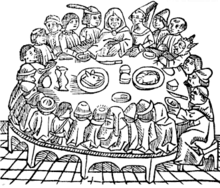Los cuentos de Canterbury
obra de Geoffrey Chaucer
| Los cuentos de Canterbury | |||||||||||
|---|---|---|---|---|---|---|---|---|---|---|---|
 Una xilografía de la segunda edición de William Caxton de Los cuentos de Canterbury (1483) |
|||||||||||
| Título original | The Canterbury Tales | ||||||||||
| Autor | Geoffrey Chaucer | ||||||||||
| Publicación | 1400 (hace 624 años) | ||||||||||
| Idioma | Inglés | ||||||||||
| Enlaces externos | |||||||||||
Los cuentos de Canterbury (en inglés, The Canterbury Tales) es una colección de cuentos escritos por el escritor inglés Geoffrey Chaucer entre 1387 y 1400.
Citas
editar- «Como mujer casada usaré mi instrumento / tan libremente como Dios me lo ha dado / y si no lo hago, ¡qué Dios me castigue! / Mi marido lo disfrutará mañana y noche (...) Como me dijeron mis maridos,/yo tenía el mejor conejo».
[In wyfhode I wol use myn instrument/As frely as my Makere hath it sent/If I be daungerous, God yeve me sorwe!/Myn housbond shal it have bothe eve and morw (...) Trewely, as myne housbondes tolde me,/I hadde the beste 'quoniam'][1]
- «Cuando ese abril con sus dulces aguaceros haya penetrado hasta las raíces de la sequía de marzo...».
[Whan that Aprill with his shoures soote/The droghte of March hath perced to the roote,...».[2]
- «Ningún hombre llega, ni a la mitad del desparpajo de la mujer a la hora de maldecir y mentir».
[For half so boldely can ther no man/Swere and lyen as a womman can].[3]
- «¿Qué hay mejor que la sabiduría? Una mujer. ¿Y qué hay mejor que una buena mujer? Nada».
[And what is bettre than wisdom? Womman. And what is bettre than a good womman? No-thing]. [4]
Referencias
editar- ↑ "Female ‘soveraynetee’ in Chaucer’s ‘The Wife of Bath’s Prologue and Tale". A. Melville, Alexandra Líneas 149–52 y 608–09.
- ↑ Frase que abre el libro medieval Los cuentos de Canterbury. Recogido por David Crystal en Middle English. British Library y por S. Ratcliffe en el Oxford Essential Quotations, 6.ª ed. Oxford University Press, 2018. ISBN 9780191866692. Línea 72.
- ↑ En "El cuento de la comadre de Bath". Líneas 227–28, según Melville.
- ↑ En "El cuento de Melibeo". Línea 2297; Chaucer, Geoffrey. Los cuentos de Cantorbery, Volumen 1, p. 233. Editorial Reus (s.a.), 1921. Y la edición de Pr.Gutenberg.
Bibliografía
editar- Chaucer, Geoffrey The Complete Works of Geoffrey Chaucer (ed. de Walter Skeat), 2021. Oxford, Clarendon Press. Project Gutenberg
